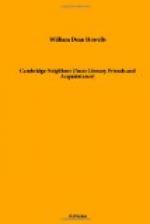It was my pleasure, my privilege, to bring Gunnar before the public as editor of the Atlantic Monthly, and to second the author in many a struggle with the strange idiom he had cast the story in. The proofs went back and forth between us till the author had profited by every hint and suggestion of the editor. He was quick to profit by any hint, and he never made the same mistake twice. He lived his English as fast as he learned it; the right word became part of him; and he put away the wrong word with instant and final rejection. He had not learned American English without learning newspaper English, but if one touched a phrase of it in his work, he felt in his nerves, which are the ultimate arbiters in such matters, its difference from true American and true English. It was wonderful how apt and how elect his diction was in those days; it seemed as if his thought clothed itself in the fittest phrase without his choosing. In his poetry he had extraordinary good fortune from the first; his mind had an apparent affinity with what was most native, most racy in our speech; and I have just been looking over Gunnar and marvelling anew at the felicity and the beauty of his phrasing.
I do not know whether those who read his books stop much to consider how rare his achievement was in the mere means of expression. Our speech is rather more hospitable than most, and yet I can remember but five other writers born to different languages who have handled English with anything like his mastery. Two Italians, Ruffini, the novelist, and Gallenga, the journalist; two Germans, Carl Schurz and Carl Hillebrand, and the Dutch novelist Maarten Maartens, have some of them equalled but none of them surpassed him. Yet he was a man grown when he began to speak and to write English, though I believe he studied it somewhat in Norway before he came to America. What English he knew he learned the use of here, and in the measure of its idiomatic vigor we may be proud of it as Americans.
He had least of his native grace, I think, in his criticism; and yet as a critic he had qualities of rare temperance, acuteness, and knowledge. He had very decided convictions in literary art; one kind of thing he believed was good and all other kinds less good down to what was bad; but he was not a bigot, and he made allowances for art-in-error. His hand fell heavy only upon those heretics who not merely denied the faith but pretended that artifice was better than nature, that decoration was more than structure, that make-believe was something you could live by as you live by truth. He was not strongest, however, in damnatory criticism. His spirit was too large, too generous to dwell in that, and it rose rather to its full height in his appreciations of the great authors whom he loved, and whom he commented from the plenitude of his scholarship as well as from his delighted sense of their grandeur. Here he was almost as fine as in his poetry, and only less fine than in his more fortunate essays in fiction.




